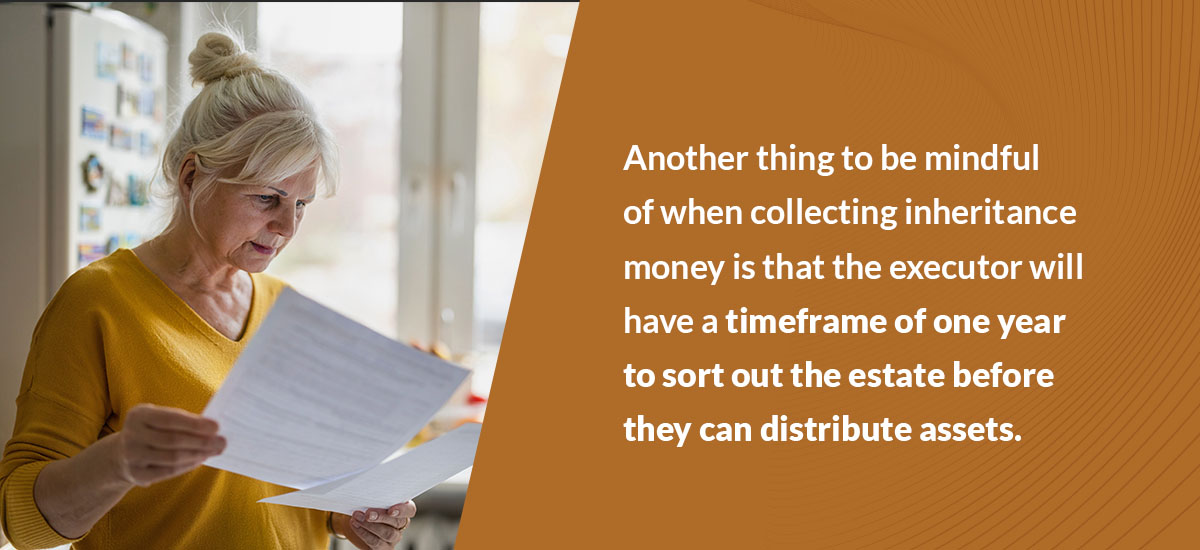When someone dies and leaves you money in their will, there are a lot more steps than simply claiming your money and receiving it. How you receive inheritance money depends on the probate process, which involves collecting a list of assets and verifying the validity of each before heirs and beneficiaries like yourself receive your promised assets.
Knowing what happens when you inherit money can help make the process run more smoothly during this emotional period. From verifying your identity to how long it takes to receive your inheritance money, here’s what you should expect to do after your loved one mentions you in a will.
Talk to the Executor
Your loved one may have named someone as an executor. If they didn’t, an executor will be appointed. They ensure your loved one’s wishes are carried out responsibly. The first step you need to follow when collecting inheritance money is finding out who the executor is and speaking to them. This will help you gain essential information about the will and what to expect.
While the executor is commonly an attorney, other times, it may be a trusted family member. In this case, it’s important to remember that this person may still be mourning their loss. Consider when the most appropriate time would be to ask them about the will, and be respectful when asking them questions and asking if you can see the will.
Establish Whether You Need to Contact a Lawyer
If your loved one’s will is going through probate, other relatives or people close to the deceased may have an issue with the information and names mentioned in the will. The probate process is there to authenticate the document and distribute the assets according to your loved one’s wishes.
If someone has a valid reason to be concerned about the justness of the will and the assets your loved one wanted you to have, you may need to get a lawyer. Bringing in a lawyer can be beneficial if you have a strong reason to claim an estate and its validity. You may go without a lawyer if the amount you are set to receive is close to or less than the estimated attorney’s fees.
Present the Required Documents
Before collecting inheritance money, you may need to verify your identity with the appropriate documents. Some documents you may need to provide include a driver’s license and passport to confirm your address and identity. A solicitor may also conduct a bankruptcy search before you receive your inheritance money.
Pay Bills and Debts
Mostly, the executor will take care of costs associated with legal fees, debts and other expenses. The remaining assets will then be distributed to beneficiaries and heirs, saving you from incurring costs personally. However, paying these expenses may reduce your inheritance amount. Some of the bills that may go out to creditors include:
- Utility bills
- Mortgages
- Medical bills
- Personal loans
- Credit card payments
Take Care of Taxes
Some gifts in a will are subject to tax, meaning you have to pay inheritance tax for the gift before you receive it. Whether you need to pay inheritance tax depends on your state, the amount you inherited and your relationship to the deceased.
Additionally, the government may tax you on your earnings from the inheritance. For example, if the money sits in a savings account, you may need to pay taxes on the interest that accrues within the account. You may also need to pay taxes depending on what you do with the inheritance.
Be Mindful of Timeframes

Another thing to be mindful of when collecting inheritance money is that the executor will have a timeframe of one year to sort out the estate before they can distribute assets. This means receiving your inheritance money can take up to a year or longer.
You May Be Able to Claim Money
Sometimes, your loved one may have had money owed to them as part of their estate. If it is a formal loan or agreement, these people should still make their payments. You may be able to collect money such as:
- Tax rebates
- Capital from your deceased loved one’s business
- Formal debts others owed the deceased
- Life insurance
- Money from forgotten savings and pensions
- Money from pension schemes
The Time It Takes to Execute a Will Can Vary
When the estate is simple and without property, you can receive your inheritance money within a year at minimum as a beneficiary or heir. It is common for the probate process to take years when someone challenges the will, and more complex assets are involved. Some factors that can cause delays include:
- Disputes about the will
- Investigations of the estate
- Missing or complicated assets
- Difficulty locating beneficiaries
- Property sales that fall through
- Missing will or property title deeds
Complex assets such as business assets, farmland or foreign properties can also delay the process. These assets can take a long time to value and validate according to government rules. The timeframe of this process can stretch further if the executor is selling the estate’s property, depending on the property’s condition, its value and the current market.
You May Receive Your Inheritance at a Different Stage Than Other Beneficiaries
Different types of beneficiaries may receive their gifted assets at different stages depending on the circumstances of the estate. For example, specific beneficiaries will likely receive their items earlier in the process, while residuary beneficiaries will only receive their inheritance after the probate process is complete.
This is because residual beneficiaries are people who get the balance of the estate. Residual beneficiaries can also receive their inheritance at different stages. They may receive a partial payment after most of the bank accounts and investments have closed, then receive their final payment after the executor has sold the deceased’s property or paid all their remaining expenses.
Collect Your Inheritance Money Faster With Inheritance Funding Company
Collecting inheritance money can take several months or years when a will goes through probate. If your loved one has passed on and left you money, you may want to use those funds to pay off debt or support your family. Inheritance Funding offers probate advances that allow you to receive a portion of your probate cash immediately rather than waiting years to receive your inheritance.
Unlike inheritance loans that require you to pay back what you borrow with interest, inheritance advances provide you with the cash you need quickly — sometimes within the same day. You pay a simple flat fee, and once probate closes, Inheritance Funding receives an agreed-upon portion directly from the estate, and you get the rest of your inheritance. We welcome you to request a free quote from Inheritance Funding and contact our professionals today to receive your probate advance right away!


